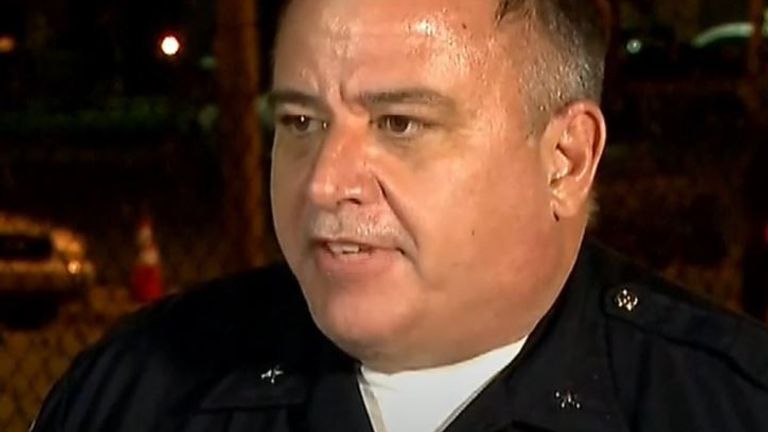Louisville is a tinder box of rage and frustration.
Protesters have been taking to the streets for 121 nights since Breonna Taylor was killed.
This week the city has been in a state of emergency, roads closed and businesses barricades. Military personnel line the streets, armoured vehicles patrol the airport and protesters hold vigil at a square, waiting for curfew to fall before they march.
But there’s another group who’ve started to make their presence felt in the past few days – loaded with rifles and army fatigues they look like active military personnel.
But they are in fact a far-right group who call themselves the Oath Keepers, described by the Southern Poverty Law Centre as one of the largest radical anti-government groups in the US.
We find them in the car park of a hotel. There are about 30 of them and the protesters marching by are immediately aggravated by the sight of them.
The anti-government group insists they’ve been invited here by business owners. The founder, Stewart Rhodes tells me: “We’re here to protect businesses and apartments. We’re also here protecting residents.
“We don’t want to say who they are or where they lived because they’re afraid. We’re protecting life and property.”
The crowd that’s started to form around them is clearly incensed.
There are tense exchanges playing out everywhere as the two sides face off.
One member, George Douglas Smith Jr, tells me he won’t raise his gun unless damage is done. He said: “What they do in their organisation is fine. Unless they try to turn the buildings down.
“I made a solemn oath to the store owners that I won’t let that happen even if this crowd beats me downs and kill me.”
It is an austerely incongruous sight, but it’s become painfully commonplace in the pockets of tension around America that seemingly keep emerging. A nation where heavily armed civilians feel emboldened to demonstrate their power.
It constantly feels like the mood and risk can radically shift at any moment.
The protesters eventually make their way out of the car park, many encouraging each other not to rise to the bait.
For another two hours, they walk around Louisville. They eventually make their way to a church where they’re welcomed in and offered refreshments.
The police keep watch on the edge of the grounds. It is a far less disparate and chaotic scene than some of the skirmishes and arrests we witnessed the night before, when two officers were shot.
:: Subscribe to Divided States on Apple podcasts, Google Podcasts, Spotify, and Spreaker
But it’s a constant game of cat and mouse that’s hard to imagine any resolution to right now.
Twenty five minutes out of town, we meet neighbours of Breonna Taylor who were there the night she died. They’re incredulous at the grand jury’s decision not to charge any officers with her killing.
Deja Moore lives opposite Breonna’s apartment. She tells me there were gun shells all around her door and she could see Breonna’s body.
The attorney general said the police announced their presence. But Deja is emphatic that she and others didn’t hear it.
She is exasperated at the lack of progress on racial justice in America, but defiant too.
“Honestly a change needs to come. Whether they like it or not it’s going to turn violent. We’re upset, angry, disappointed and if they won’t change it we will,” she said.
Quite what the change looks like in a country where it’s proved so illusive, is very unclear.




